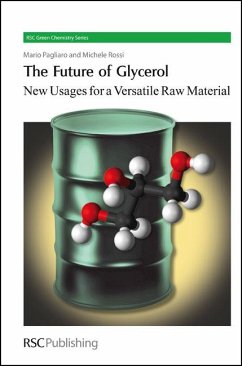By-products of global biodiesel manufacturing are a global fact and the immense amount of glycerol by-product stacking unsold until mid 2005 gave a visual image of the huge loss of energy and material resources. This was due to the lack of suitable conversion processes for this, the oldest organic molecule known to man, despite various experiments by some biodiesel producers. The large surplus of glycerol by-product which entered the chemical market has caused closure of existing glycerol plants and the discovery of processes that use glycerol as a raw material for the production of value-added chemicals and even of energy. This was followed by 3-4 years of intense research activity worldwide, where human chemical ingenuity opened up a number of practical avenues to convert glycerol into value added products of mass consumption. For instance, the batteries of your laptop and iPod, as well as your car's antifreeze will soon be based on glycerol, the same sweet viscous substance currently present in soaps.
Reporting and commenting on such achievements this book aims to inform chemistry professionals, including managers and technologists, on the large potential of glycerol as versatile biofeedstock for the production of a variety of chemicals, polymers and fuels. Whilst filling a gap in the current literature, this nicely illustrated book is written in a clear, concise style and presents the numerous uses of glycerol as a new raw material which are starting to have an impact on industry worldwide. Elucidation of the principles governing the new chemistry of glycerol goes along with updated industrial information that is generally difficult to retrieve.
Through its 10 chapters, the monograph tells the story of a chemical success -- that of converting glycerol into value added products -- and highlight the principles that made it possible. Whether as solvent, antifreeze, detergent, monomer for textiles or drug, new catalytic conversions of glycerol have been discovered that are finding application for the synthesis of products whose use range from everyday life to the fine chemical industry. Readers are also shown how a number of practical limitations posed by glycerol chemistry, such as the low selectivity encountered employing traditional stoichiometric and older catalytic conversions, were actually solved based on the understanding of the fundamental chemistry of glycerol and by application of catalysis science and technology. Readers also find a thorough discussion on the sustainability issues of bioglycerol production covering societal, environmental and economic dimensions to reflect the needs of politicians and citizens of today who require cross border research. By explaining the advantages and problems as well as offering solutions the book aids understanding as to whether biodiesel and glycerol refineries are convenient and economically sound.
Chemical research on glycerol has shown that given a strong economic input, chemists are able to rapidly devise a whole set of new upgrading processes for the biorefinery and that the latter integrated unity for production energy and chemicals is not just dream of environmentally-minded scientists but an inevitable reality of today. Due to the ever decreasing energy return on energy invested, global society is being forced to switch from fossil to renewable fuels until cheap and abundant energy of solar origin becomes a reality. In this evolution, biofuels, particularly biodiesel, will certainly play a role and therefore, glycerol will be a key raw material for the biorefinery for many years to come. Dealing with such a hot topic of urgent scientific and commercial interest, this is a true "living book" in which updates will be posted yearly on the RSC website.
The book's users include industry's top managers and management consultants and also R&D and marketing managers. Along with technical content of a high quality, this is also a strategic book for top managers of the chemical, biofuel, oleochemical and detergent industries.
Reporting and commenting on such achievements this book aims to inform chemistry professionals, including managers and technologists, on the large potential of glycerol as versatile biofeedstock for the production of a variety of chemicals, polymers and fuels. Whilst filling a gap in the current literature, this nicely illustrated book is written in a clear, concise style and presents the numerous uses of glycerol as a new raw material which are starting to have an impact on industry worldwide. Elucidation of the principles governing the new chemistry of glycerol goes along with updated industrial information that is generally difficult to retrieve.
Through its 10 chapters, the monograph tells the story of a chemical success -- that of converting glycerol into value added products -- and highlight the principles that made it possible. Whether as solvent, antifreeze, detergent, monomer for textiles or drug, new catalytic conversions of glycerol have been discovered that are finding application for the synthesis of products whose use range from everyday life to the fine chemical industry. Readers are also shown how a number of practical limitations posed by glycerol chemistry, such as the low selectivity encountered employing traditional stoichiometric and older catalytic conversions, were actually solved based on the understanding of the fundamental chemistry of glycerol and by application of catalysis science and technology. Readers also find a thorough discussion on the sustainability issues of bioglycerol production covering societal, environmental and economic dimensions to reflect the needs of politicians and citizens of today who require cross border research. By explaining the advantages and problems as well as offering solutions the book aids understanding as to whether biodiesel and glycerol refineries are convenient and economically sound.
Chemical research on glycerol has shown that given a strong economic input, chemists are able to rapidly devise a whole set of new upgrading processes for the biorefinery and that the latter integrated unity for production energy and chemicals is not just dream of environmentally-minded scientists but an inevitable reality of today. Due to the ever decreasing energy return on energy invested, global society is being forced to switch from fossil to renewable fuels until cheap and abundant energy of solar origin becomes a reality. In this evolution, biofuels, particularly biodiesel, will certainly play a role and therefore, glycerol will be a key raw material for the biorefinery for many years to come. Dealing with such a hot topic of urgent scientific and commercial interest, this is a true "living book" in which updates will be posted yearly on the RSC website.
The book's users include industry's top managers and management consultants and also R&D and marketing managers. Along with technical content of a high quality, this is also a strategic book for top managers of the chemical, biofuel, oleochemical and detergent industries.
Dieser Download kann aus rechtlichen Gründen nur mit Rechnungsadresse in A, D ausgeliefert werden.









